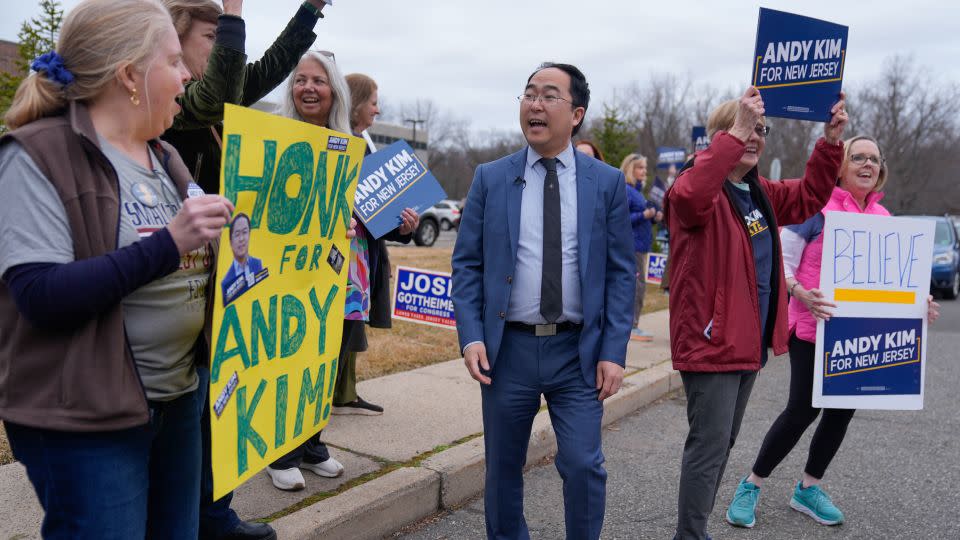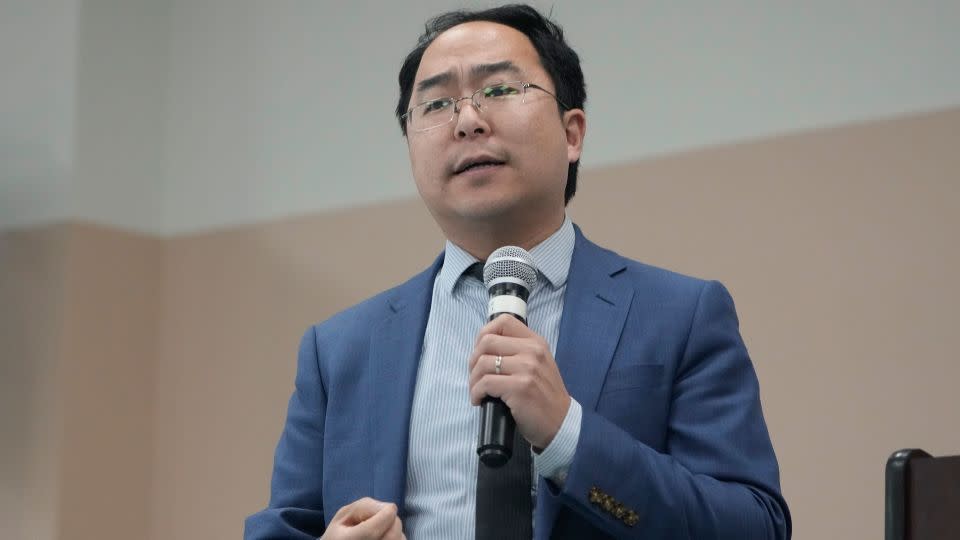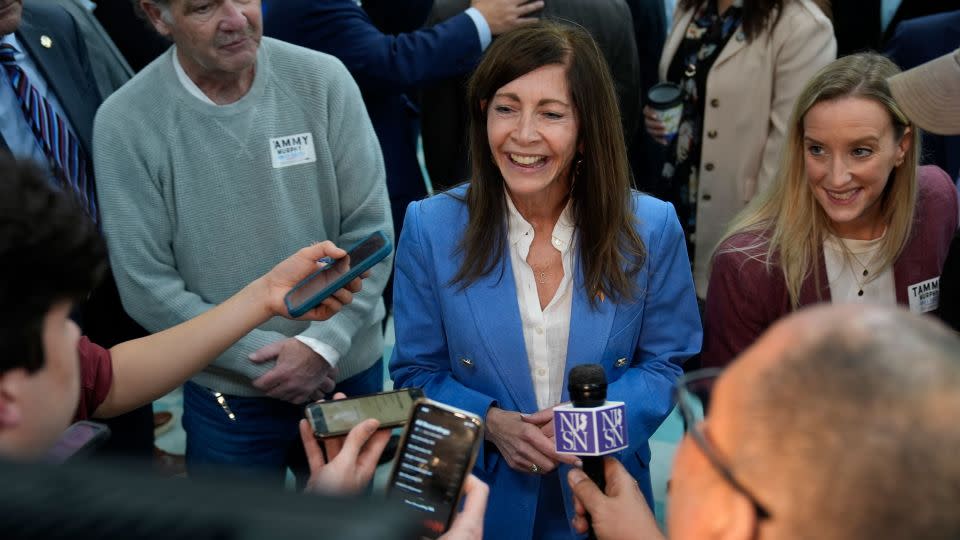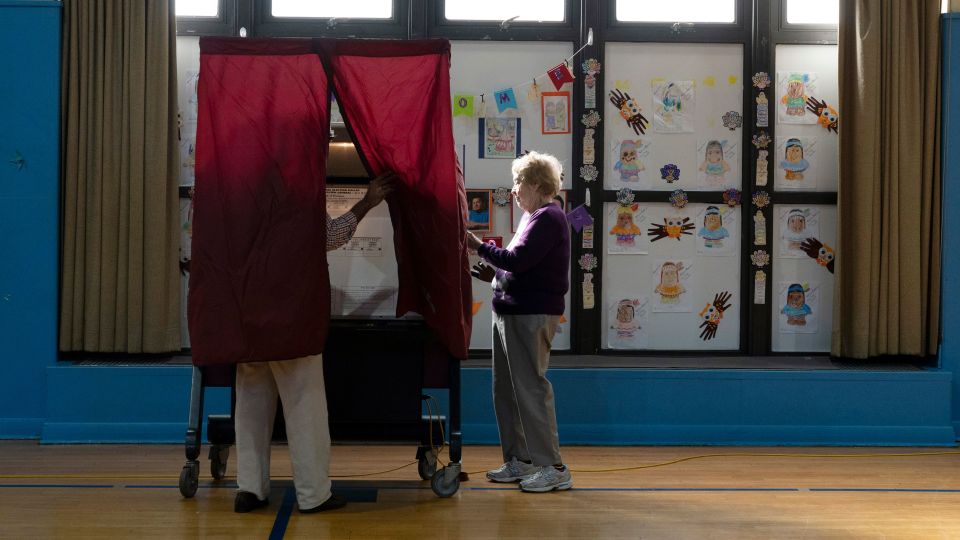A federal judge in Trenton is poised to rule as early as this week on a lawsuit aimed at kneecapping local bigwigs’ influence over party primaries and the nominating process.
Democratic Senate candidate Andy Kim is asking the court for a preliminary injunction banishing the so-called party line – a ballot structure that allows county leaders to give preferential placement to their endorsed primary hopefuls. A ruling in the South Jersey congressman’s favor, though applicable only to the June primary, would – with the state’s off-year elections on the horizon – accelerate the unraveling of a system that has for decades allowed heavy-handed party bosses to dominate the makeup and character of New Jersey politics.
The fight for transparency and election fairness in the Garden State goes back more than a century. After some significant early wins for reformers, the balance of power shifted back to the machine over the course of the 20th century. By the time Donald Trump, the tabloid-star-turned-politician, came along in 2015, the system appeared to be hardened in its favor.
But Trump’s ascent to the presidency, even in a state that he lost by more than half a million votes in 2016, triggered a grassroots revolt that eventually put the “party line” in the crosshairs of good government advocates. The “pro-democracy” agenda embraced by President Joe Biden and national Democrats after the January 6, 2021, riot at the US Capitol brought the issue further into the mainstream. Kim’s lawsuit, nearly a carbon copy of one originally filed three years ago, is attracting national attention because of his looming primary against New Jersey first lady and first-time candidate Tammy Murphy.
Kim and Murphy, among others, are vying to replace Sen. Bob Menendez, the longtime Democratic incumbent now facing a thick and colorful assortment of corruption charges that could land him in prison for years. Menendez announced Thursday that he would not run for reelection in the Democratic primary but again left open the possibility of an independent bid this summer.
Tammy Murphy, the wife of two-term Gov. Phil Murphy, entered the primary in November, about two months after Kim. Her arrival was greeted with a flood of endorsements, several of which either guaranteed or strongly suggested she would be given a plum spot on the primary ballot – and a potentially decisive advantage over Kim before the campaign had begun in earnest.

The tipping point
Murphy’s decision to seek the seat, and the speed with which local pooh-bahs lined up behind her, triggered what could be a generational realignment in a state historically dominated by powerful party bosses in the way that many Americans associate with a bygone era – recalling New York’s Tammany Hall of the mid-19th century.
Those structures largely came apart elsewhere over the past few decades, but New Jersey Democratic leaders have retained their unique influence thanks in large part to “the line,” a shorthand for the prized ballot real estate controlled by county party officials, many of whom are themselves unelected.
The practice places the names of party-backed candidates for a variety of offices in a single, prominent column. Those who do not receive a place on “the line” are scattered across the ballot, marooned in what is often referred to as “Ballot Siberia.” Reform advocates and progressive Democratic groups operating outside the good graces of entrenched leadership have long railed against the practice, calling it anti-democratic and tantamount to voter suppression.
For decades, though, “the line” existed without a serious challenge. The risks for dissenters was too high and, by its nature, the process successfully froze out critics who might want to run for office and seek change from within. The broader chilling effect largely zeroed out criticism even among minor players.


But the explosion of grassroots liberal engagement following Trump’s election – a shock to the system that ignited a wave of new interest that echoed the post-Watergate push for good government laws – emboldened “line” opponents.
Frustrated, anxious and angry, the Democratic grassroots across the country revolted at every level of government, mixing intense lobbying of federal lawmakers with a surge in outsider candidacies for down-ballot offices. Groups such as Indivisible, with its hyper-engaged local chapters – many stocked with middle-aged, upper-middle-class, first-time political activists – began to question everything from party strategy to the arcane institutional processes that had operated for so long with a minimum of oversight.
“The fight against the county line and the political machines really goes back to the election of Trump, when it picked up serious speed,” said Rutgers professor Julia Sass Rubin, who testified in Kim’s lawsuit and has conducted extensive research on the line’s outsize influence. “There were a number of grassroots organizations that formed, we saw this nationally, especially started by women.”
But Rubin said it was not until Murphy announced her Senate run, and immediately received broad backing from New Jersey Democratic leaders, that the issue exploded.
“The Tammy Murphy-Andy Kim race has put (the issue) on steroids. It has really amplified general public awareness, which was building. But it was building among the aware, kind of progressive grassroots,” Rubin said. “This brought it into the mainstream in a big way.”
Following Trump’s election, rank-and-file liberals in New Jersey – like many other largely Democratic states – rushed to enmesh themselves in local politics. But their ambitions were mostly thwarted. Though New Jersey Democrats picked up US House seats in the 2018 midterms, the state seemed immune to an explosion of political insurgencies, typified not only by the rise of “The Squad” but also the ascent of younger female and minority candidates who sought to wrest power from what they viewed as an indifferent, self-serving establishment.
“The (Democratic newcomers) thought they were on the right team here and thought because they were Democrats, they had the ability to stand up and say proudly that they’re the party for democracy, especially in light of Trump being president,” said longtime progressive activist Sue Altman, a Democratic candidate for the state’s 7th Congressional District. But that initial optimism was blunted when “they found out that at the local level or the city level or the county level or the state legislative level, that their own beloved Democrats were not practicing ‘little d’ democracy,” Altman said.
‘The line’ as ballast against the liberal grassroots
The complications facing would-be reformers in New Jersey were initially underscored by the state party’s lack of political turmoil. Though hardly a machine choice, wealthy former Goldman Sachs executive and Democratic National Committee finance chair Phil Murphy won the governor’s office in 2017.
Over the next few years, as political insurgents like Alexandria Ocasio-Cortez, across the river in New York, and Cori Bush in Missouri unseated longtime Democratic incumbents in races up and down the ballot, progressive groups largely bypassed New Jersey. The state’s expensive media market and the bureaucratic barriers facing outsider campaigns made it an unwise place to spend precious resources.
“It is extremely difficult to engage in any kind of competitive primaries in New Jersey because at the end of the day, the winners are likely going to be chosen by the establishment,” said Ezra Levin, the co-founder and co-executive director of Indivisible.
Indivisible does not, like more confrontational groups including Justice Democrats, typically get involved in fraught primary fights. Their membership, Levin said, is engaged on multiple policy fronts, from health care to immigration, “but the very top issue that they care about is democracy itself – this feeling that it was under threat and this sense that the Democratic Party when Trump got elected was not equipped to take on that threat.”
Levin says that for Indivisible groups, the battle in New Jersey over “the line” is not about a preference between Kim or Murphy, though the organization has endorsed Kim.
“When I’m talking to our advocates, I will always say that the enemy isn’t MAGA, the enemy is cynicism and nihilism and fatalism,” Levin said. “Corrupt systems like the ‘county line’ in New Jersey (is) an enemy because that dissuades folks from actually getting involved. And if folks don’t get involved, then we’ll lose.”
As the Murphy-Kim race has heated up, interest in ending – or, among party leaders, defending – “the line” has also increased in size and intensity. A 2021 lawsuit, brought by and supported by a coalition of progressive Democrats, including Altman and the New Jersey Working Families Alliance, has been wending its way through the court system for years.


But for Kim, there was no time to waste. He effectively took up the old litigation late last month, using the same lawyers, in a bid to redesign the ballots before the June 4 primary. His request of the court, simply put, is for a federal judge to order that New Jersey follow all other states and group together candidates for any given office.
On Monday, Kim testified in US District Judge Zahid Quraishi’s courtroom that he believed the current process “to be averse to the pursuit of democracy.”
“I’m not asking for any advantage for me,” Kim told the court. “All I’m asking for is for New Jersey to be in line with 49 other states in terms of pursuing an office block-style ballot that would allow us to have a fairer system here.”
Though Kim has also won some county lines in this primary, and appeared on them during his own past races, the third-term congressman argued that a fundamentally unjust institution compelled him to play ball.
“Despite my personal concerns about how this went,” Kim said, “I felt I had no choice but to participate in the system.”
The Murphy campaign took a dimmer view of Kim’s motivations.
“Unfortunately, Congressman Kim’s focus has been on personal attacks and process,” said Murphy spokesperson Alexandra Altman, who has previously dismissed the lawsuit as a “hypocritical stunt.”


Kim campaign spokesperson Katey Sabo disputed that characterization, calling the line’s potential undoing “a critical issue in protecting our democracy.”
The arguments against redrawing the ballots, at least in this case and the current discourse, are less high-minded, with the defendants in the suit – clerks from the 19 counties with county line ballots – contending that the changes sought by the plaintiff, Kim, would be too difficult to implement this late in the campaign-election calendar. (Ballots are printed and mailed out well before the June 4 primary date.)
A ruling is expected in the coming days or weeks. Tammy Murphy, who is not involved in the case, has said she will follow the rules, regardless of the outcome. Altman, her spokesperson, told CNN that Kim’s strategy “does not help the real New Jerseyans struggling to make ends meet or protect their reproductive rights from being stripped away.”
Days of chaos
No matter how the judge decides in Kim’s last-ditch bid, “the line” appears to be on borrowed time.
Ahead of the hearing last week, New Jersey Attorney General Matt Platkin announced in a letter to the court that he would not defend the “challenged statutes,” calling them “unconstitutional.” He will also drop out of the 2021 case, which remains in the judicial pipeline, after initially defending “the line.”
The governor, under whom Platkin served as general counsel before being appointed to his current post, publicly disagreed with his longtime political ally, saying a defense of the system “would have been appropriate and consistent with the actions” of Platkin’s predecessors.
“Outside the context of any campaign, Governor Murphy has consistently and accurately noted that the bracketing of candidates is permitted by duly enacted laws that have been on the books for decades,” Murphy spokesman Mahen Gunaratna told CNN. “It is well-established that Attorneys General have a general obligation to defend the constitutionality of statutes, regardless of their own personal views.”
That dust-up followed a weekend in which Kim had secured the backing of Democrats in Morris and Atlantic counties – where the process isn’t as tightly controlled by party leadership. In Camden County, where the local boss keeps a tighter grip, video of another Senate candidate, progressive Patricia Campos-Medina, being blocked from entering the county Democratic convention went viral.
Around the time Platkin’s memo went out, the Hoboken Democrats – who operate under the powerful Hudson County Democratic Organization, whose leader backed Tammy Murphy immediately upon her entering the race – announced that their own process had yielded a landslide victory for Kim. Moments later, Hoboken Democratic Committee Chair Rachel Hodes announced her resignation, alleging harassment by Murphy allies and a “gross rejection of democracy” by the county group.
“Since we announced this (endorsement) meeting, I began receiving calls and emails denigrating and diminishing the integrity of our process,” Hodes wrote. “Multiple senior advisors on the Tammy Murphy campaign called me to coerce me into changing our process, essentially calling it a sham.”
Both sides have acknowledged that a key sticking point was the Hoboken Democrats’ decision to solicit written statements from the candidates rather than inviting them to deliver their message in person. (Candidates were allowed to make more direct appeals to Hoboken committee voters.)
The train kept rolling on Monday morning when, shortly before the federal court hearing began, Jersey City Mayor Steven Fulop, who is running to succeed Phil Murphy as governor in 2025, switched sides in the Senate primary and backed Kim.
“It’s no secret I’ve been disappointed with the (Tammy Murphy) campaign and how it has been conducted,” Fulop said in a statement, which also suggested the first lady consider bowing out of the race. “I’ve expressed that over the last two months repeatedly both privately and publicly, and at this point, it’s clear to me that I was wrong with my early support and endorsement of Tammy Murphy for Senate.”
The growing backlash among ambitious officials underscored the rapidly changing tides of public opinion – and awareness. On Wednesday, in another sign of concern among brass from both parties (New Jersey Republicans also employ “the line” in their primaries), state Senate and Assembly leaders announced they would begin “a public process on ballot design in New Jersey, including a thorough and thoughtful review of other states, as well as a process that involves input from the public.”
But their statement also echoed other supporters of “the line,” insisting that the legislature – and not the courts – keep “the authority to determine the law regarding ballot design and the appropriate discretion used by county clerks.”
“We are prepared to work in a bipartisan manner to ensure public trust in a transparent and democratic process in New Jersey,” the leadership quartet said.
For many Democrats in the Garden State, however, their words landed with a thud. How the court views the pledge, and whether it is taken into consideration, remains to be seen.
For more CNN news and newsletters create an account at CNN.com
